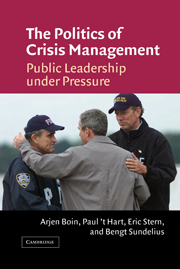Book contents
- Frontmatter
- Contents
- List of figures and table
- Acknowledgments
- 1 Crisis management in political systems: five leadership challenges
- 2 Sense making: grasping crises as they unfold
- 3 Decision making: critical choices and their implementation
- 4 Meaning making: crisis management as political communication
- 5 End games: crisis termination and accountability
- 6 Learning from crises and the politics of reform
- 7 How to deal with crisis: lessons for prudent leadership
- References
- Index
2 - Sense making: grasping crises as they unfold
Published online by Cambridge University Press: 22 September 2009
- Frontmatter
- Contents
- List of figures and table
- Acknowledgments
- 1 Crisis management in political systems: five leadership challenges
- 2 Sense making: grasping crises as they unfold
- 3 Decision making: critical choices and their implementation
- 4 Meaning making: crisis management as political communication
- 5 End games: crisis termination and accountability
- 6 Learning from crises and the politics of reform
- 7 How to deal with crisis: lessons for prudent leadership
- References
- Index
Summary
What the hell is going on?
The 9/11 terrorist strike took America (and the rest of the world) by complete surprise. As the drama unfolded live on television screens across the globe, people found themselves watching in disbelief: “This cannot be happening.” This sense of collective stress soon gave rise to a pressing question, one that lingers on as we write this: how could this have happened?
In hindsight, this question is less baffling than it seemed at the time. Commentators across the world were quick to point out that the United States had finally experienced on its own soil what many other countries had been forced to deal with for many years – terrorism. Outside the United States one would read and hear that American foreign policy had bred anti-Americanism; terrorist actions therefore were more or less to be expected. In the American media, Pearl Harbor analogies gave way to retrospectives of the 1993 World Trade Center bombing and the foiled plots involving exploding airliners and airport attacks. The 9/11 crisis events were shown to have roots.
Americans then learned how the 19 terrorists had pulled it off: how they had entered the country and outlived visa requirements, took flight lessons, convened with other terrorists around the globe, walked through airport security armed with knives, and how they navigated their hijacked planes unhindered toward the unguarded core institutions of the country. Americans learned that foreign intelligence services had provided their American sister organizations with ominous and rather specific warnings.
- Type
- Chapter
- Information
- The Politics of Crisis ManagementPublic Leadership Under Pressure, pp. 18 - 41Publisher: Cambridge University PressPrint publication year: 2005



